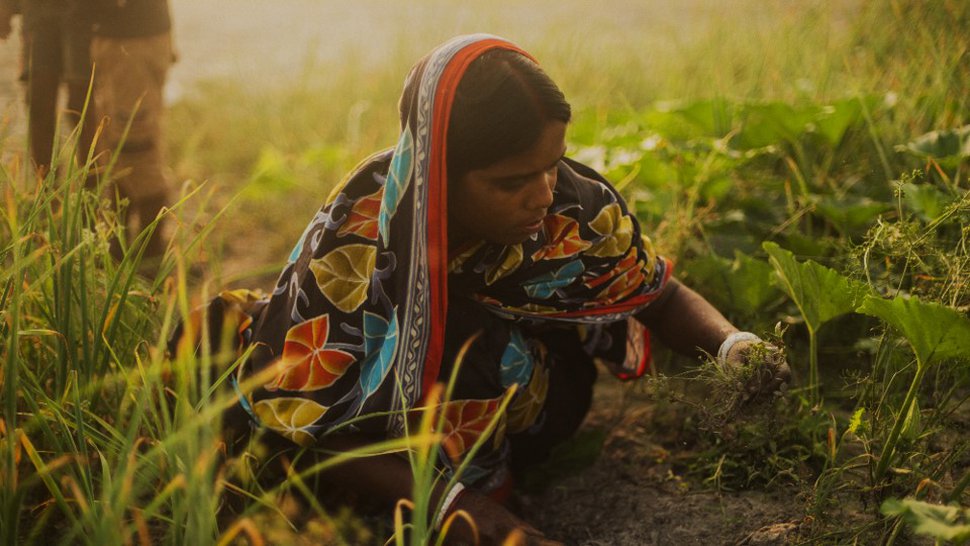The climate crisis is coming to our plates. Here’s how we need to support farmers
We are living through a time of disruption in the development and climate sectors. At the same time, we are navigating an increasingly divided world. Yet, as the impacts of climate change continue to escalate, without regard for national or state lines, preserving a sense of global solidarity is still urgent.
Food systems are vital for our collective stability and security.
Smallholder farmers - many of them women - grow 83% of the food consumed in South Asia and sub-Saharan Africa. Climate change is eroding their ability to survive and feed their countries.
Half a billion small farms around the world are exposed to increasing changes in temperature and rainfall. Working together to protect our food systems in a changing climate is a strategic priority, especially when public spending shrinks, and market volatility increases.
We can do this if we focus our investments in the following three ways.
First, we must prioritise locally led solutions that can catalyse sustainable economic growth. Experience demonstrates that effective solutions emerge when communities themselves identify the challenges they are facing and co-create solutions for them. In Bangladesh in the 1980s, for example, women who had borrowed loans to buy dairy cows could not make any profit from the milk because they were unable to get a good price in their local markets. What they made was only enough to pay back their loans.
In response, they worked with local organisations to establish dairy social enterprises so that they could store and transport their milk products to urban markets for higher prices. Those social enterprises today are the biggest dairy brands in Bangladesh. It is experiences like this that led the Global Commission on Adaptation to formulate eight locally led adaptation principles that ensure that strategies to adapt to a changing climate are contextually relevant, community-driven, and sustainable.
Second, we must invest in what works. The UN Secretary General António Guterres has called for greater investments in early warning systems and climate information services, for example. New York and Texas combined have more weather stations than the entire continent of Africa, even though they have the equivalent of just 2.75% of Africa's land area and 3.3% of its population.
Climate information in and of itself is not a silver bullet, but it is a powerful investment when combined with other tools. A farmer can use seasonal forecasts to make more informed decisions on what and when to plant. With tailored farm loans, they can buy seeds which are, for example, more salt-tolerant. With crop insurance, they can de-risk that investment, in case of limited market demand, or a disaster. A comprehensive strategy - one that integrates access to climate information services, climate-resilient technology, financial support, technical training, and post-production market access - will give us our best chance at equipping farmers to continue farming.
Third, women must be front and centre. In agriculture, closing the gender gap can increase productivity by up to 30%. Studies have shown that women are more perceptive of climate change and often quicker to adopt climate-resilient innovations than men. When they are included in decision-making and have access to climate-smart agricultural programmes, the benefits ripple far beyond their farms, strengthening food security, reducing poverty, and accelerating climate adaptation.
The time to act is now. Countries are expected to submit updated Nationally Determined Contributions to limit warming, and the window to keep the world on track with the goals of the Paris Agreement is quickly closing. We can turn to science, we can read the headlines, or we can just look around us.
Now, more than ever, we need bold leadership and real investment. The future of our food is being decided right now, in the fields of millions of smallholder farmers. How we choose to support them today will determine what’s on our plates - and if there’s anything - tomorrow. We still have time to make the right choices.
_____________________________________________________
Asif Saleh is Executive Director of the Bangladeshi NGO BRAC and Ole Thonke is the Danish Undersecretary for Development Policy and Climate Ambassador.
On April 28, 2025, the Danish government and BRAC convened representatives from the governments of Uganda, Tanzania, Liberia, Bangladesh, and Sweden, together with philanthropic organisations, including the Bill & Melinda Gates Foundation and the Novo Nordisk Foundation, to discuss, strategise, and promote locally-driven solutions for climate adaptation with focus on women smallholder farmers.

